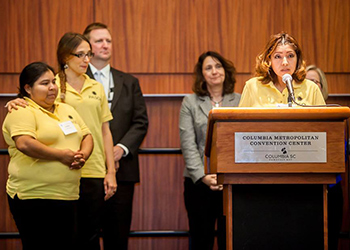It's the 'A-List' from the Arnold School
April 28, 2014
Graduate Scholars highlighted in Breakthrough
Amira Osman of the Department of Health Promotion, Education, and Behavior and Fred Tabung of the Department of Epidemiology and Biostatistics were named Breakthrough Graduate Scholars in the spring issue of Breakthrough magazine.
The Breakthrough Graduate Scholars program honors USC graduate students who demonstrate excellence in the classroom and make considerable contributions to research and scholarly activities in their field.
Osman and Tabung, who will be profiled in upcoming "I Am Public Health" Spotlight feature articles, are among 14 graduate scholars from throughout the University to receive this recognition.
Exercise Science students honored
The Department of Exercise Science presented awards for excellence at USC's Honors and Awards Day program for undergraduate students.
The Outstanding Exercise Science Student Awards were presented to Ryan Thomas Sankovic and Emily Elizabeth Learner, both of whom also were selected for USC's Inaugural Class of Graduates with Leadership Distinction.

Veronica Salmoran, shown at podium, accepted the Lewis W. Blackman Patient Advocate Award on behalf of the PASOs program. The award was presented at the S.C. Transforming Health Symposium.
PASOs program receives Patient Advocate Award
The S.C. Hospital Association awarded PASOs of the Midlands volunteers (Promotores) the Lewis W. Blackman Patient Advocate Award at the seventh annual S.C. Transforming Health Symposium at the Columbia Metropolitan Convention Center.
The awards honor individuals who have advanced patient safety and health care quality in South Carolina. Promotora Veronica Salmoran accepted the award on behalf of the group.
Founded in 2005, PASOs is a community-based organization, hosted by the Arnold School of Public Health. The PASOs vision is a healthy South Carolina with a healthy Latino community. PASOs provides education, family support services, organizational capacity building and community leadership.
The Patient Advocate Award honors a patient safety advocate not involved in direct patient care, who must have demonstrated “exemplary dedication to quality improvement and patient safety.” PASOs Promotores of the Midlands have worked to build bridges between the Latino community and health care providers since 2010, with an ultimate goal of healthier, stronger South Carolina families.
Salmoran is known for her work in the area of domestic violence prevention. She facilitates a “Healthy Relationships” educational workshop at PASOs. She also is a community ambassador with health and social agencies,bringing the voice of the Latino community to work for a more accessible and appropriate health system.
Community Health Workers, or Promotores de Salud, are people who promote health in their own community by providing leadership, health education and referrals to care. Promotores (men) and Promotoras (women) belong to the same culture and speak the same language as the people they serve. They are culturally-competent leaders who link people to health and human resources, encourage peers to seek care, empower community members and promote healthy habits. PASOs supports the development of grassroots Latino leaders so they can effectively inform their communities and be agents of change."
The awards, established in 2008, are named in memory of Lewis Wardlaw Blackman, who died at age 15 from complications after undergoing an elective surgical procedure in 2000.
Breakthrough highlights research of Arnold School faculty member
The research of Dr. Saurabh Chatterjee, an assistant professor in the Department of Environmental Health Sciences and director of the Environmental Health and Disease Laboratory, is highlighted in the spring issue of Breakthrough magazine from the Office of Research.
Chatterjee was a featured speaker at the recent meeting of the Society of Toxicology (SOT) and ToxExpo in Phoenix, Ariz. He spoke at a session titled, "Does this chemical make my liver look fat?"
With 34.9 percent of the U.S. population being classified as obese, metabolic syndrome which includes vascular complications, diabetes, leptin resistance and insulin resistance among other things, has been exponentially increasing. Other developed and developing countries are also not alien to this obesity epidemic any more.
Because the liver being the primary site of metabolism in the body, metabolic disorders cause abnormal fat depositions in the liver, which might progress to several liver diseases and cause severe health problems. And, although alcohol-consumption and high fat/high caloric food intake have been linked to this problem, they cannot account for the entire fatty liver disease scenario.
These facts have led toxicologists and other scientists to explore environmental toxins as possible causal agents behind the exacerbation of NAFLD (Non Alcoholic Fatty Liver Disease).
Chatterjee discussed his laboratory’s research on how bromodichloromethane, a drinking water disinfection byproduct is affecting NAFLD in a diet-induced obese model of mouse even at the levels in drinking water currently deemed permissible by the EPA. Bromodichloromethane is metabolized by a liver enzyme: CYP2E1, to its free radical form and causes oxidative stress which leads to progressive stages of NAFLD in obese subjects. His research also focuses on exploring the role of leptin, various mechanistic molecular pathways and epigenetic factors that result in the exacerbation of the disease.
The scientific session where Chatterjee spoke was selected for national press coverage by the Society of Toxicology.



_01.jpg)
_02.jpg)